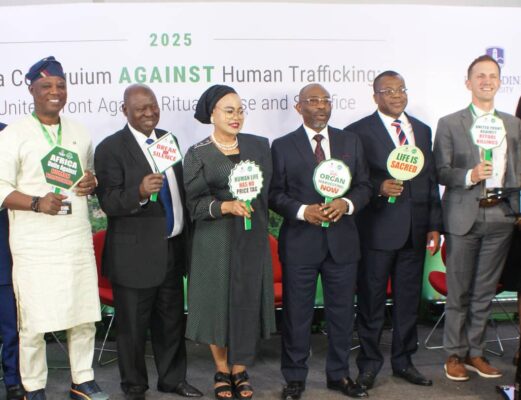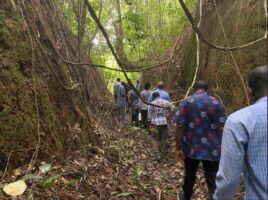Lagos State Governor, Babajide Sanwo-Olu, has called for a united continental effort to combat ritual abuse and human sacrifice, emphasizing that the fight cannot be won in isolation but must be pursued collectively across borders, institutions, and communities.
Speaking at the opening of the First Annual Africa Colloquium Against Human Trafficking in Lagos, Governor Sanwo-Olu stressed that collaboration is essential, noting that “this evil knows no boundaries.”
The Lagos state government through the Ministry of Justice organized the two-day programme in partnership with U.S.-based Pepperdine University, with the theme, “A United Front Against Ritual Abuse and Sacrifice.”
Described as one of the most heinous crimes against humanity, the governor says, “Human trafficking is not an abstract problem. It is real, and it is close to home. It affects millions across Africa especially women and children through forced labour, sexual exploitation, domestic servitude, and the deeply troubling cases of ritual abuse and sacrifice. Behind every statistic is a face, a name, and a story of pain that must never be ignored.”
He added that, “Through our Lagos State Task Force Against Human Trafficking, working closely with NAPTIP and international partners, we are strengthening prosecution systems, rehabilitating survivors, and raising public awareness. But the government alone cannot win this fight. It demands a united front, a coalition of justice ministries, law enforcement, traditional and religious leaders, community-based organizations, and the private sector.”
The event also serves as a united move to dispel the dangerous myths that wrongly link power, success, or protection to the taking of human life, which fuel ritual abuse.
On his part, the Attorney General of the Federation, Lateef Fagbemi (SAN), represented by Ezinne Nwaokoro, says the fight against human trafficking is now a national priority, which is why this colloquium matters.
”If traffickers can collaborate across borders, so must we. And beyond just legal tools, we need strong communities, survivor voices, regional partnerships, and a justice system that protects — not traumatises — those who come forward.”
The Chief Judge of Lagos State, Justice Kazeem Alogba, commended the legislature for enacting stiff penalties against offenders and pledged that the judiciary would enforce the law with strictness. “The Lagos judiciary will ensure that anyone found guilty of trafficking or ritual abuse faces stringent punishment in accordance with the law,” he assured.
Read Also
He also urged local communities to take the lead in identifying and reporting suspicious activities. “If the community does not perceive human trafficking and ritual abuse as wrong, perpetrators will continue to go unpunished. Every citizen must be their neighbour’s keeper,” he added.
The Lagos State Attorney-General and Commissioner for Justice, Lawal Pedro, SAN, who also chairs the Lagos State Task Force Against Human Trafficking, outlined the state’s multi-pronged response to the menace. Between 2022 and 2024, he said, over 4,700 victims were rescued and supported, while five million residents were reached through community awareness campaigns. Lagos also trained 109 local government focal persons as anti-trafficking advocates and expanded shelters for survivors.
He further highlighted the enactment of the Lagos State Organ Harvesting Prohibition Law 2024, which criminalises organ trafficking and imposes severe penalties on offenders, including medical professionals involved in illegal human organ trade.
“Let history say that from Lagos in 2025, Africa took a stand and never turned back,” he said. “Let us refuse to accept the killing of our children as normal, reject the exploitation of women, and silence that empowers crime. When Africa chooses unity over isolation, we can protect the vulnerable and safeguard human dignity.”
The Director of the Sudreau Global Justice Institute, Pepperdine University, USA, Prof. Cameron Collum, called for a united African response to end ritual abuse and human sacrifice, describing the practices as “pure evil” that must be confronted through collective action, policy reform, and justice system strengthening across the continent. “While human trafficking is widely acknowledged and addressed globally, ritual abuse and human sacrifice remain largely unspoken issues. Everywhere I go, leaders acknowledge ritual killings as a real problem, yet few programs tackle it. This conference aims to change that by starting a Pan-African conversation to end these atrocities,” he declared.
The Director-General of the National Agency for the Prohibition of Trafficking in Persons (NAPTIP), Binta Bello, also warned that the growing nexus between ritual abuse, human sacrifice, and human trafficking poses a grave threat to Africa’s moral fabric and security.
Speaking through the agency’s Director of Intelligence, Josiah Emewerem, the DG cited data from the National Bureau of Statistics that over 150 ritual killings were recorded in the first half of 2025 alone, with women and youths as major victims. The National Institute for Legislative and Democratic Studies (NILDS), also documented over 168 ritual-related deaths in 2022 and nearly 100 in 2024.
According to her, the Lagos colloquium marks a historic moment for Africa’s anti-trafficking movement. “For too long, global discussions on trafficking have focused narrowly on sexual and labour exploitation,” she said. “Today, we are expanding that conversation to include ritual abuse and sacrifice — equally grave violations of human rights and dignity.”
The programme brought together about 200 delegates made up of lawyers, policymakers, judges, prosecutors, NGOs, and community leaders, from across the country and 15 African countries, Including Kenya, Uganda, Cameroun, and Tanzania.
The conveners say the Colloquium would become an annual event to track progress, strengthen partnerships, and sustain reforms across the continent.





